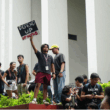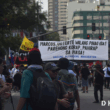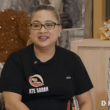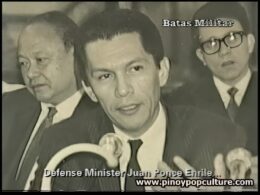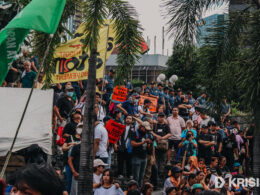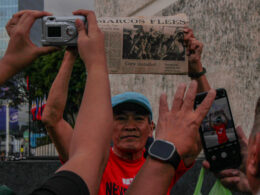To vote or not to vote, to abstain or not to abstain—these are the questions.
History offers the present with guideposts upon which today’s decision-making could be based.
In a Dec. 30, 2021 explainer, political science professor Francis Joseph Dee described suffrage as an uncontroversially recognized and essential part of procedural democracy.
But he averred that the debate on the notion of voting as a duty stands. Self-interest is rarely viewed as a motivation for voting as ”the cost of voting […] outweighs the benefit,” he argued.
He weighed the costs and benefits of abstentions as well as its nuances: about a “minority vote” problematized as an effect of inequality, unit abstention, its probable effects on election results, among others.
Dee drove his rationale harder to its coffin: “Abstention can be a valid way to fulfill one’s civic duty, but just like voting, it should be the conclusion of a decision-making process that involves a lot of hard questions.”
Hard questions, hard decisions. The University of the Philippines (UP)’s studentry is now facing such a critical juncture.
In the 2017 University of Sto. Tomas (UST) Central Student Council elections, abstentions won.
An array of factors were laid out to make sense of this victory: lack of substance, failure to win over the trust of the student body, repetitive campaign tactics, question of competence and satisfaction, even loss of confidence with traditional student political parties. Some pointed out that this could be a telltale sign that Thomasian voters were becoming more critical.
Six years after, during last year’s University Student Council (USC) elections, UP faced its first tussle with abstention. The chairperson race, marred with the withdrawal of one of the two official candidates, capped with an abstain win in the polls. This year, the whole council was caught in the similar whirlpool.
The similar factors in UST’s case in 2017 have, in one way or another, also been thrown out to explain how—and more crucially, why—abstentions swept UP Diliman in 2023 and 2024. But this year’s was a graver blowback in the USC: It was the first time the students voted virtually a blank slate since its official restoration in 1980.
In 44 years, the terrain has drastically changed. From an integral student institution that fought Ferdinand Marcos Sr.’s dictatorship, and fought for its urgent revival after the dictator closed it down after Sept. 23, 1972, it now fights for one thing as elementary as its own raison d’etre.
Or maybe, in the face of another looming abstain vote, for its very survival.
There is one quiddity, however, that draws the difference between the UST and UP Diliman abstention episodes.
Aside from identical discussions on substantial platforms, campaign strategies and rapport with student voters, one gargantuan issue—a serious and sensitive one—has become a more decisive impetus behind abstentions: The public exposé of cases of sexual harassment, abuse, even rape, against key members and officers of the Student Alliance for the Advancement of Democratic Rights in UP (STAND UP) during last year’s polls.
It gripped the party-alliance with successive public criticism and disaffiliations right after the issues were raised in a public forum as more victims instantaneously came out with testimonies online. Their candidates had to withdraw.
But, as the Philippine Collegian reported, due to “a deep lack of confidence on the platform” of STAND UP’s rival, UP Alyansa ng mga Mag-aaral para sa Panlipunang Katwiran at Kaunlaran (UP ALYANSA), abstentions won instead.
It haunted STAND UP during last year’s polls. It haunted the electorate and independent candidates during last May’s elections. It still haunts the voters and their choices during the upcoming special elections, not much as a specter waiting to spook them, but as a reminder of basic principles both Diliman student activists and USC candidates are bound to uphold—justice, truth, and holding people, organizations, and power structures to account—if abstain is to be overridden, if the student voters are to be convinced, if genuine student representation is to be translated in praxis.
But abstentions, to lift Chairman Mao Tse-Tung’s words, do not fall from the sky.
Issues like the ones that marked the 2017 UST abstain win are not trivial and may also be tangible within the UP student movement—as a whole. That’s for later. But all the more should the accusations and real accounts of sexual misconduct and abuse within UP activist formations be not trifled with. According to the victims themselves, the internal cases have festered inside STAND UP and other affiliates’ “internal processes” for a long time.
This is one major fuel behind both the USC abstentions and the evident decline in student participation since 2023. The deep-seated lack of confidence now reaped by candidates and student leaders who identified with STAND UP—or its politics—stems largely from the fact that, whatever way an observer looks at it, the Diliman progressive student movement failed to satisfy the growing call for justice of the victims within their own ranks.
To put it more bluntly: the cases were obfuscated, to a certain extent, by so-called “coddlers” of the perpetrators.
Accountability has become a rising cry, not just among the victims of sexual abuses within the student movement and those who empathize with them, but among a student body drastically turning into a disillusioned electorate more prepared to align with an ‘abstain’ choice.
As it was in 2023, so will it be in 2024: Accountability is a defining issue of the student council elections.
But any discussion of how the student movement dealt—or still deals—with the barrage of sexual abuse cases inside activist circles must also be punctuated with nuance. Sure, even minimal steps must have been taken within the internal framework of justice, whatever shape it takes, that STAND UP and its other affiliated organizations sustain. Sure, the notions of due process for the accused and benefit of the doubt for those burdened with the important task of handling the cases must not be taken off the table.
Yet in the more than one year since the issues were first brought to light, the sluggish pace of exacting genuine accountability is what hounds both the candidates of this year’s special elections and a public who is still anticipating the fulfillment of the student movement’s primordial duties to it, and more crucially, to the aggrieved and the abused within their ranks.
Will an “abstain” vote mend the damage this entire maelstrom has wrought upon the UP Diliman community?
The root of this entire abstain-or-not-abstain debate is the smoldering call for justice demanded from the student movement, which inevitably involves a majority of candidates in the ongoing polls. Without real rectification palpable among the university’s body politic, the students will be pushed and pushed more to a corner, where abstain appears to be the only sane choice in a field intoxicated with candidates they deem to be under a clique of coddlers.
Abstain is not the anomaly; rather, it is the symptom. The challenge of searching for a panacea now lies on the shoulders of the candidates who threw themselves on the lot.
In July 1981, just when the second USC elections hovered around, a succession of three issues of the Collegian were littered with the exchanges of two student activists about the state of student militants in Diliman at the apex of the Marcos dictatorship.
But the discussions weren’t about military firepower, or truncheons, or Arrest, Search, and Seizure Order. It focused on sloganeering, student politicization, “political shallowness and absence of critical thinking,” progressive tradition, and the university’s role as an arena of intellectual, political, and social struggle.
In a rejoinder to Patricio N. Abinales’s criticism of student militancy in Diliman, Leandro L. Alejandro, former Collegian features editor who would rise to be one of the university’s most steadfast student leaders within and without, wrote: “The moment one stops criticizing oneself and one’s own criticisms is the moment one ceases to become a critic.”
Perhaps one vigorous antidote to the burgeoning call to abstain is to persevere in this critical role of both the university and student activists to be a critic—not only of social ills, but also of what plagues the progressive movement: the footdragging of justice, the apparent whitewashing of the cases, the internal power play that enables both, and so on.
If the progressive ranks will remain silent, look the other away or act complicit to this vicious cycle, the wounds will fester.
The clarion call on the students and the student leaders vying for positions in today’s USC is not to abdicate the right to vote or to push for the elimination of abstention, but to struggle for a conscience vote within which the students will scrutinize not only the candidates’ acumen in social struggles, but also their inward conscience in ensuring that the student movement is a genuine safe space for all.
In the end, a conscience vote in this volatile political situation involves the students’ critical and vigilant participation before, during, and after elections to establish a genuine University Student Council that upholds both the university’s security against state fascism, commercialization, and miseducation; and the students’ safety against the pandemic of predatory behavior, coddling of sexual abusers, politics of command, obfuscation, and a culture of blind conformity.



